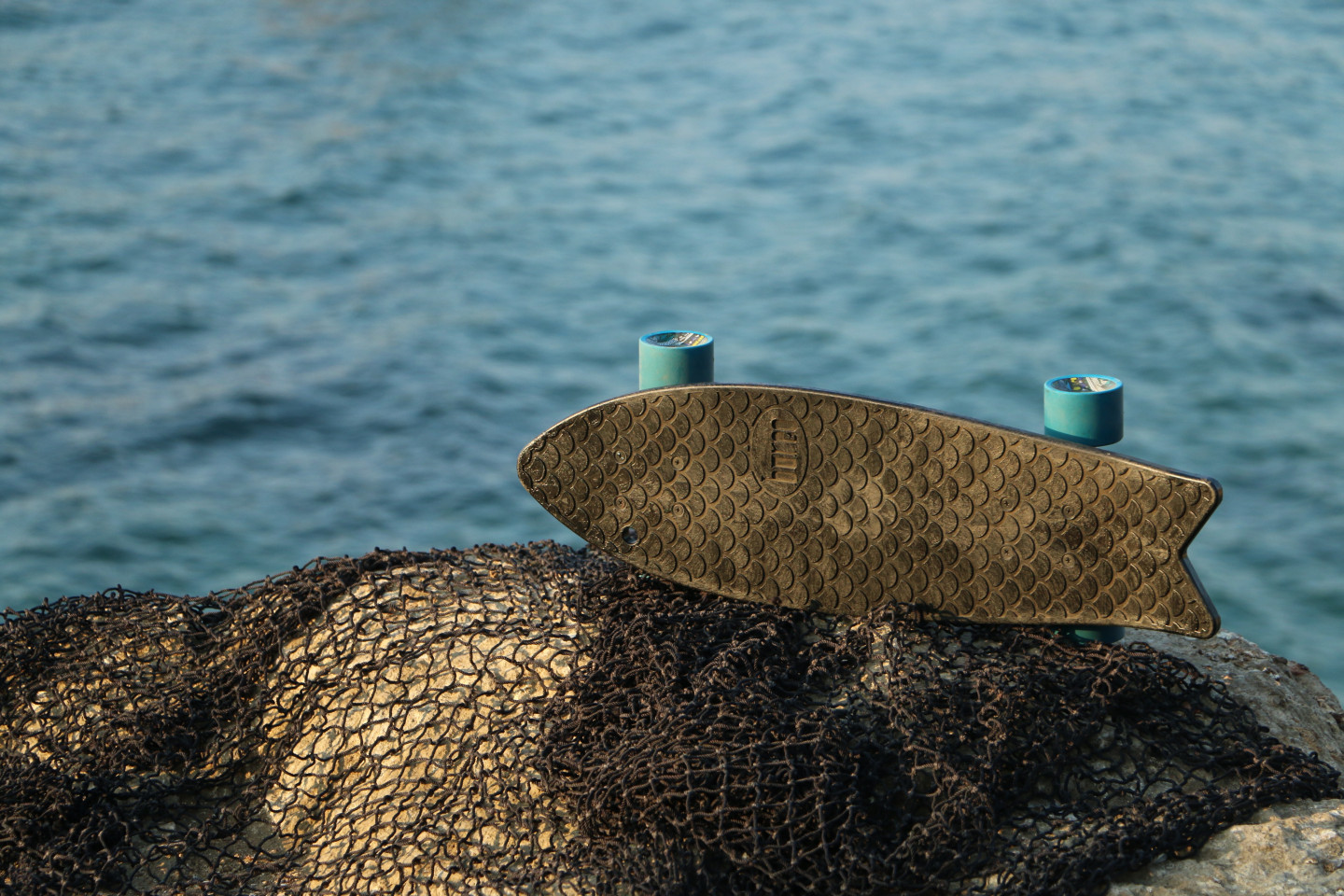This skateboard is manufactured in Chile through Bureo’s Net Positiva initiative – Chile’s first fishnet collection and recycling programme. A major threat to marine life, discarded fishing nets make up an estimated 10% of the plastic pollution in the ocean. Net Positiva provides fishermen with environmentally sound disposal points for fishnets, while Bureo receives recyclable and durable raw materials.
Loop
Skateboard. Bureo (Fishing nets, Chile, 2013)
Bureo Founders, Ben Kneppers, David Stover, Kevin Ahearn
Could you tell us a little bit about your professional backgrounds, the inspiration of connecting fishermens’ netting to producing skateboards, and how you got interested in the Circular Economy?
David Stover: Our interest in the circular economy came from the background of co-founder Ben Kneppers, who had been working as an environmental consultant and activist for several years. We connected all of our founding skills in Engineering, Finance and Sustainability to find a solution for discarded fishing nets and develop a sustainable business model. We became interested in fishing nets after researching the various forms of waste in the ocean, and finding a material where we thought we could have our biggest impact. Through the support of the Chilean economy we were able to establish our recycling program in 2013.
(Bureo Co-founders Ben Kneppers (left) and Kevin Ahearn (right) stand in Santiago, Chile to demonstrate the amount of fishing net recycled into each Bureo skateboard through ‘Net Positiva’, Bureo’s fishnet collection and recycling program.)
Could you describe your process of developing the business model?
David Stover: In developing our business model we took a unique path. We connected our passion for the ocean with an idea to prevent plastic from entering the waterways. In working through the establishment of our recycling program, ‘Net Positiva’, we set a goal to be sustainable and have measurable impacts. We decided to leverage the collected materials for our own products, setting up a for-profit venture that would seek to solve an issue (discarded fishing net) through an innovative product while supporting local economies and environments.
How would you describe the different mindsets of Circular Thinking/Design for the CE versus traditional linear thinking for the linear economy?
David Stover: Designing for the circular economy is designing a product to have an end of life solution. For us, we are focused on long life products that are able to be recycled at end of life. Further, it is looking at products that yield a waste stream (likely linear products) and finding a way to harvest the value in their material at the end of life. We hope to see the end of the word ‘waste’ in our lifetime. With all products designed to be composted, reused or recycled at the end of life.
(Bureo Co-Founder Ben Kneppers leads the collection of discarded fishing nets from an established recycling point in Cocholgue Chile. Based in Chile Kneppers manages a team of workers to collect and transport nets before they are recycled in Santiago, Chile.)
How important is the social component to the flow of the Circular Economy?
David Stover: As a young company we have the fortune of being in control of all aspects of the business, which enables us to set the best practices in place from the beginning. However, this is also our challenge, as we are required to use limited resources to accomplish a broad spectrum of tasks. In addition to establishing a recycling program, building community/government support, we are tasked with marketing and selling a commercial product.
What has been the most challenging part of the process?
David Stover: As a young company we have the fortune of being in control of all aspects of the business, which enables us to set the best practices in place from the beginning. However, this is also our challenge, as we are required to use limited resources to accomplish a broad spectrum of tasks. In addition to establishing a recycling program, building community/government support, we are tasked with marketing and selling a commercial product.
(Minnow Skateboard. Bureo’s recycled fishnet cruiser skateboard rests on a pile of fishing gear just north of Valparaíso, Chile.)
How have skateboarders responded to the product so far? How does it compare to other skateboards? Does the spirit behind your enterprise connect to skateboard culture more generally?
David Stover: We have about 4,000 skateboards in the market. Our boards are a form of small cruisers, both casual and performance. This is a much different product than your standard wood ply skateboard. They fall in the spectrum of products between a ‘longboard skateboard’ and a traditional board. We find that our enterprise connects more with the ocean and mountain culture as opposed to the standard skate industry. We see a lot of crossover of enthusiasts in this market that enjoy our board and appreciate our mission.
Next steps?
David Stover: We are actively involved in research and development projects to expand the applications for our recycled materials. We recently launched a new skateboard model ‘The Ahi’, and we are hoping to announce a few new collaboration projects before the end of the year.
For anyone interested in this field, what books or articles would you recommend to read?
David Stover: Business, ‘Creating Shared Value’ by Michael E Porter & Mark R. Kramer , Harvard Business Review. Environment, Plastic Ocean, by Charles Moore. Entrepreneur Experience, Start something that matters, by Charles Moore
Click here for Bureo Skateboards





